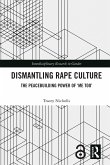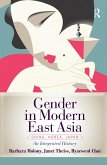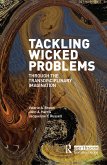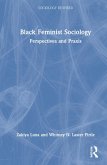Bringing together two voices, practice and theory, in a collaboration that emerges from lived experience and structured reflection upon that experience, Ueno and O'Mochain show how entrenched discursive forces exert immense influence in Japanese society and how they might be most effectively challenged.
Hinweis: Dieser Artikel kann nur an eine deutsche Lieferadresse ausgeliefert werden.
Hinweis: Dieser Artikel kann nur an eine deutsche Lieferadresse ausgeliefert werden.
In this book, O'Mochain and Ueno capture the heart of sexual politics in contemporary Japan. At this heart is the male hysteria of a ruling elite with international status anxiety. These men react with exaggerated hostility to demands for apology for wartime crimes like those against the 'comfort women', and whip up movements of 'hard masculinity' that have no sympathy for women and children. Sexual Abuse and Education in Japan: In the (Inter)National Shadows is a book about how this environment keeps schoolgirl rape victims and other survivors of male sexual violence quiet, on the threat of disparagement as anti-Japanese 'comfort women'. The authors judge the tactics of the global #MeToo movement unlikely successful in Japan, and offer an alternative plan of action to tackle prevalent sexual violence against women and girls in education in a country whose history is used to keep feminism down. They squarely confront the harsh reality of women's condition in 21st-century Japan while offering analyses and political possibilities that will be useful to the country's feminist movement. Readers with an interest in Japan, violence against women, and feminist international relations will be struck by the empirical evidence the authors marshall to create a far-reaching analysis of contemporary Japan and its problems of sex inequality.
Caroline Norma, Senior lecturer, Master of Translating and Interpreting, RMIT University, Melbourne
Sexual Abuse and Education in Japan by Robert O'Mochain and Yuki Ueno is a welcome and timely contribution to the recent English-language scholarship that has emerged from a post #MeToo Japan. The authors draw from psychosocial feminist theory and feminist international studies theory and use their judiciously collected data to explain the pervasiveness of sexual abuse in Japan, and to understand the challenges victims face when speaking out. The book draws a line between comfort women denialism at the level of the state-bolstered by 'male hysteria' and 'international status anxiety'-and localised minimisation of sexual violence and victims' inability to be heard and taken seriously. Readers are thus encouraged to think about the systemic nature of sexual violence, and in Japan especially, how combatting it requires not only important ground-level policies, but profound changes to how we approach women's claims to victimhood. This book, with its rich interview and survey data from education settings, and thought-provoking suggestions for positive change, will be of interest to scholars and students of feminism, political science, international relations, gender studies and Asian studies.
Emma Dalton, Japanese lecturer, Department and Languages and Cultures, School of Humanities and Social Sciences, La Trobe University
Caroline Norma, Senior lecturer, Master of Translating and Interpreting, RMIT University, Melbourne
Sexual Abuse and Education in Japan by Robert O'Mochain and Yuki Ueno is a welcome and timely contribution to the recent English-language scholarship that has emerged from a post #MeToo Japan. The authors draw from psychosocial feminist theory and feminist international studies theory and use their judiciously collected data to explain the pervasiveness of sexual abuse in Japan, and to understand the challenges victims face when speaking out. The book draws a line between comfort women denialism at the level of the state-bolstered by 'male hysteria' and 'international status anxiety'-and localised minimisation of sexual violence and victims' inability to be heard and taken seriously. Readers are thus encouraged to think about the systemic nature of sexual violence, and in Japan especially, how combatting it requires not only important ground-level policies, but profound changes to how we approach women's claims to victimhood. This book, with its rich interview and survey data from education settings, and thought-provoking suggestions for positive change, will be of interest to scholars and students of feminism, political science, international relations, gender studies and Asian studies.
Emma Dalton, Japanese lecturer, Department and Languages and Cultures, School of Humanities and Social Sciences, La Trobe University








